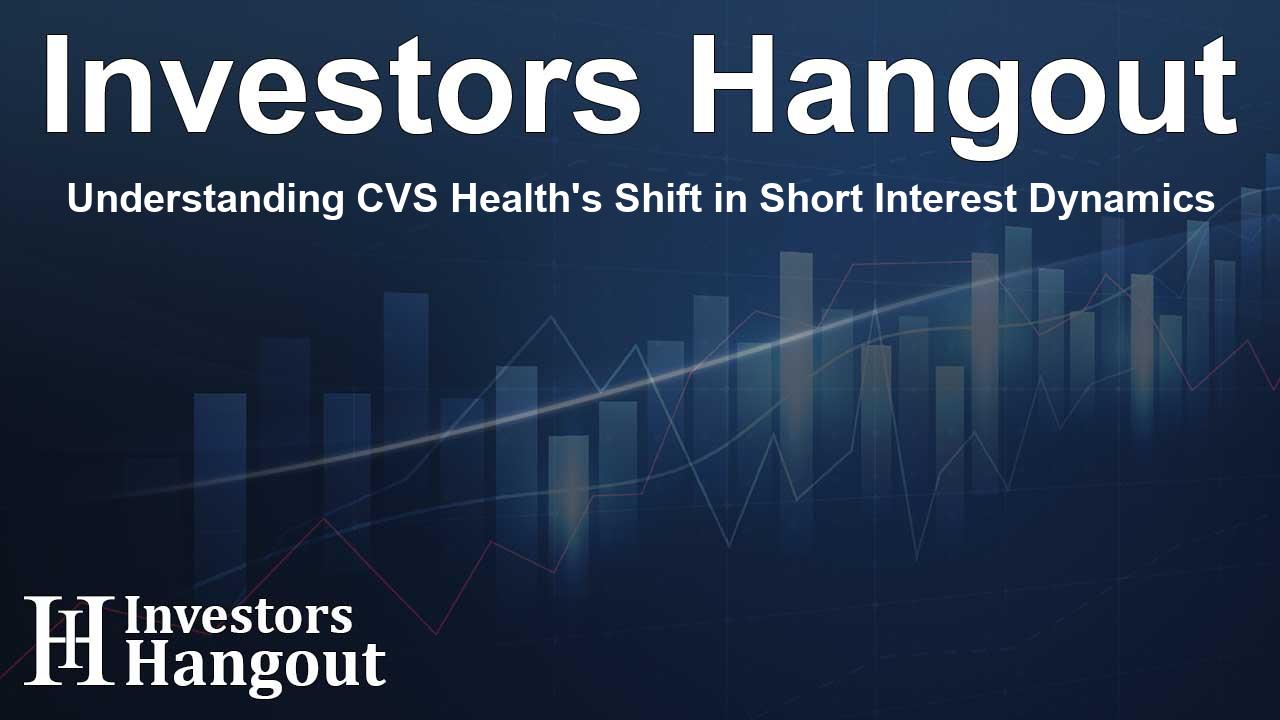Understanding CVS Health's Shift in Short Interest Dynamics

CVS Health Short Interest Overview
CVS Health (NYSE: CVS) has recently witnessed a noteworthy change in its short interest dynamics. The latest data indicates that the short percent of float has decreased by 6.12%. There are currently 17.40 million shares sold short, representing about 1.38% of the total shares available for trading. Given the trading volume, it is estimated that it would require an average of 2.02 days for traders to cover their short positions.
The Significance of Short Interest
Short interest refers to the total number of shares that investors sell short but have not yet bought back to close their positions. Traders engage in short selling to profit from the anticipated decline in a stock's price. If the stock price decreases, they can buy back shares at a lower cost, returning them to the lender and pocketing the difference. Conversely, if the price increases, the traders incur losses.
Understanding short interest is crucial as it provides insights into market sentiment. A rising short interest can indicate that investors are becoming more bearish about a stock, while a decline suggests a more bullish outlook.
The Trends in CVS Health's Short Interest
Analyzing the recent figures reveals a downward trend in CVS Health's short interest. This reduction, however, does not necessarily predict an immediate price increase for the stock. Instead, it signals that fewer traders believe that the stock will decline in value. Keeping an eye on these fluctuations can help investors gauge market confidence.
Recent Movements in Short Selling
The chart illustrating the short interest over the past three months reflects a clear decline, signifying a shift in trading behavior. Even though fewer shares are being shorted, this scenario might be interpreted differently across the investment community. Traders and investors need to interpret these patterns carefully.
Comparative Analysis with Peers
When evaluating CVS Health's short interest, it's also valuable to compare it with peers in the healthcare industry. This approach helps investors understand CVS Health's performance relative to similar companies. Typically, analysts compare companies in terms of size, financial structure, and market presence to identify their competitive stance.
According to recent data, the average short interest percentage among CVS Health's peer group stands at 9.64%. This figure illustrates that CVS Health holds a lower short interest compared to many of its competitors, suggesting a relatively more favorable sentiment among investors in contrast to its peers.
Implications of Short Interest Changes
Interestingly, a rising short interest, while often viewed as bearish, can also serve as a precursor to potential stock price increases, especially in the face of short squeezes. In such scenarios, if a stock begins to rally, short sellers may rush to cover their positions, leading to further upward pressure on the stock price.
Understanding Market Sentiment and Predictions
Investors should continuously monitor shifts in short interest, not only for CVS Health but across the sector. This metric serves as a valuable tool in predicting future stock movements and overall market sentiment. Keeping abreast of these changes can help in making informed investment decisions. Moreover, engaging with market trends in conjunction with short interest data can enhance the accuracy of predictions.
Frequently Asked Questions
What is short interest and why is it important?
Short interest represents shares sold short that have not yet been repurchased. It is an important indicator of market sentiment towards a stock.
What does a decrease in short interest imply for CVS Health?
A decrease in short interest suggests that fewer investors expect CVS Health's stock price to fall, indicating a potentially more bullish sentiment.
How does CVS Health compare to its peers regarding short interest?
CVS Health has a lower short interest compared to its peer group average of 9.64%, indicating a more favorable outlook among investors.
Can increasing short interest be positive for a stock?
Yes, increasing short interest can sometimes lead to a short squeeze, where rising stock prices force short sellers to cover positions, leading to further price increases.
How often should investors monitor short interest?
Investors should regularly monitor short interest trends as changes can provide valuable insights into market sentiment and potential price movements.
About Investors Hangout
Investors Hangout is a leading online stock forum for financial discussion and learning, offering a wide range of free tools and resources. It draws in traders of all levels, who exchange market knowledge, investigate trading tactics, and keep an eye on industry developments in real time. Featuring financial articles, stock message boards, quotes, charts, company profiles, and live news updates. Through cooperative learning and a wealth of informational resources, it helps users from novices creating their first portfolios to experts honing their techniques. Join Investors Hangout today: https://investorshangout.com/
Disclaimer: The content of this article is solely for general informational purposes only; it does not represent legal, financial, or investment advice. Investors Hangout does not offer financial advice; the author is not a licensed financial advisor. Consult a qualified advisor before making any financial or investment decisions based on this article. The author's interpretation of publicly available data shapes the opinions presented here; as a result, they should not be taken as advice to purchase, sell, or hold any securities mentioned or any other investments. The author does not guarantee the accuracy, completeness, or timeliness of any material, providing it "as is." Information and market conditions may change; past performance is not indicative of future outcomes. If any of the material offered here is inaccurate, please contact us for corrections.